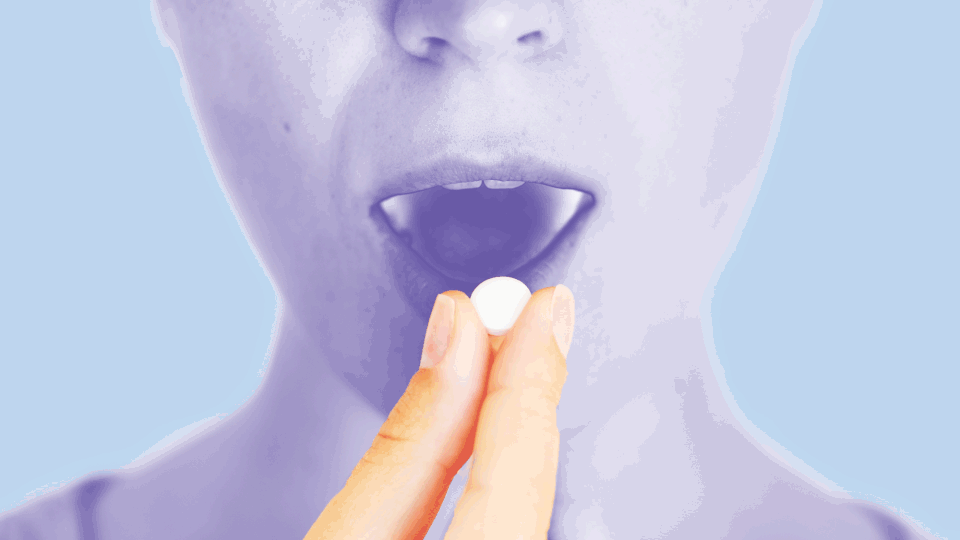Can Biotin Supplements Cause Acne?
A lot of people start taking biotin as a beauty intervention since the vitamin is a staple in supplements marketed for promoting healthier hair, skin, and nails. So if you start taking biotin only to notice more frequent breakouts, it might seem like a cruel joke.
Ironic as it may seem, there may be a link between biotin and acne. If you're wondering whether the hair growth pills you've been eyeing might sabotage your skin, here's what you should know.
Does taking biotin cause acne?
The answer to 'Can biotin cause acne?' is unclear, as "there's minimal evidence that taking biotin supplements causes acne," says New York-based dermatologist Hadley King, M.D. However, anecdotally, some users suggest there is a connection, so "further research is needed to better understand the association of acne and biotin," says Marisa Garshick, M.D., F.A.A.D., a New York-based dermatologist.
As far as why the two might even be related, "it has been theorized that biotin supplements could cause acne by interfering with the absorption of pantothenic acid," says Dr. King. (Pantothenic acid is a member of the vitamin B family. It plays a role in skin barrier function, and a well-functioning skin barrier can help keep acne-causing bacteria out.) "However, no studies have shown that taking biotin supplements or having a pantothenic acid deficiency causes acne." Biotin and pantothenic acid are two types of B vitamins (they're known as vitamins B7 and B5, respectively). Your body absorbs biotin and pantothenic acid through the same pathway in your intestines, and so according to this line of thought, increased biotin intake might mean absorbing less pantothenic acid. Essentially, the idea is that an excessive amount of biotin might crowd out pantothenic acid for open receptors, causing a pantothenic acid deficiency. (Related: Are Biotin Supplements the Miracle Beauty Fix Everyone Says They Are?)

Adobe Stock - Design: Alex Sandoval
But, get this, some studies suggest that taking biotin supplements might help prevent acne. "Interestingly, biotin has been looked at as a possible treatment for acne when combined with other ingredients," says Dr. Garshick. For example, in one study, female participants took pills containing biotin, a probiotic, vitamin E, zinc, nicotinamide, myo-inositol, and folic acid, and male participants took pills containing biotin, a probiotic, vitamin E, zinc, nicotinamide, beta-sitosterol, and boswellia. Most subjects saw an improvement in their acne after 12 weeks of taking the supplements. "In the context of the other ingredients, it is unknown how much of the improvement was actually related to the biotin as opposed to the other ingredients," says Dr. Garshick.
Whether or not taking biotin has any effect on acne, it doesn't hurt to pay attention to the frequency of your breakouts if you decide to start taking the supplement, says Dr. Garshick. "Although not everyone experiences acne when they take biotin, it is important to be mindful of in case you notice an increase in acne after starting a biotin supplement as it may be related," she says. If you do experience acne, you may be able to continue taking biotin while working with a dermatologist to find a way to manage your acne at the same time. "This would need to be addressed on a case by case basis," says Dr. King. (Related: These Hair Growth Treatments Are All Over TikTok — Are They Worth Trying?)
Is biotin worth taking in the first place?
Of course, you might have zero interest in the prospective biotin-acne link if the supplements don't have benefits to begin with. Just as there's limited research on whether biotin can cause acne, there haven't been any clinical trials showing the efficacy of taking biotin to combat hair loss, according to Dr. Garshick. A few small studies suggest taking biotin can improve brittle nails, but a 2017 meta analysis published in the Journal of Drugs and Dermatology found zero evidence to support using biotin for hair loss, she notes.
"Generally speaking, the only people who should absolutely be taking biotin supplements are those who are deficient, which is actually relatively rare," says Dr. Garshick. "Because those who are truly deficient in biotin have been found to have thinning hair and brittle nails, replacing it may help to strengthen both the hair and the nails. The caveat is that most people are not truly deficient in biotin, but anecdotally, people have found it to be helpful even without being truly deficient." (Related: I've Been Taking Hair Growth Pills for 9 Months — Here's What's Changed)
With supplements in general, you should check in with your doctor before taking one. Supplements might be accessible OTC (and in some cases, taste like gummy candy), but that doesn't mean they can't have significant implications. In the case of biotin, the U.S. Food and Drug Administration (FDA) has issued a warning that undergoing some lab tests while taking biotin could result in incorrect test results.
Long story short, the benefits of biotin and its likelihood to cause acne are both iffy. If you're still interested in testing it out for yourself, you can have at it with the green light from your doctor.

